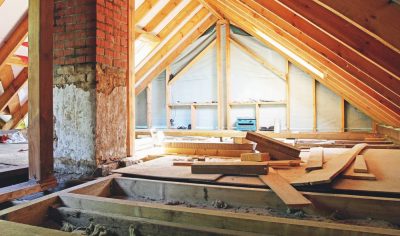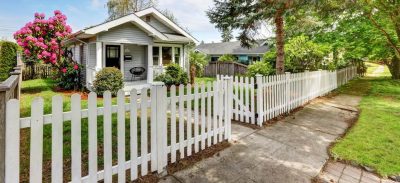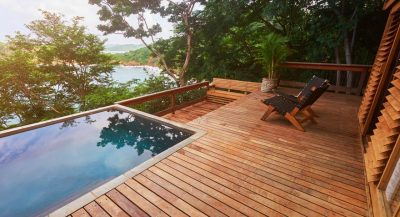- Oneflare /
- Cost Guides /
- Concreting

How Much Does Concreting Cost in 2025?
$75 - $170 per m2, depending on finish and size.
How much does concreting cost in Australia?
Professional concreting in Australia ranges from $75 per square metre, with typical residential projects costing between $2,000 and $15,000.
Key Facts:
|
Concrete is valued for its durability and versatility in projects like driveways, patios, shed foundations, and decorative pathways. If you’ve ever wondered how much does concreting cost, the answer depends on location, project specifications, and finish.
Concrete does last for decades with minimal maintenance, but most concreting costs between $75 and $100 per square metre for standard concreting work, with premium finishes and difficult sites pushing costs beyond $170 per square metre.
This guide breaks down current pricing across Australia, explains what drives these costs, and shows you practical ways to get better value from your concreting project.
How much does concreting cost in Australia based on location?
| Disclaimer: These cost estimates come from thorough research on industry and third-party rates. Please only use the listed prices as a benchmark when setting your budget. Moreover, as different areas have local taxes and service fees, the rates listed below are subject to change. |
Metropolitan areas charge more than regional centres, with Sydney and Perth leading the national rates. Meanwhile, remote locations face extra challenges with logistics, which adds to the standard pricing. Note that the average hourly wage for a concreter in Australia is about $45 to $85.
| City (State/Territory) | Average cost per m² | Hourly labour rate |
| Sydney (NSW) | $80–150 | $55–$80 |
| Melbourne (VIC) | $80–$150 | $55–$80 |
| Brisbane (QLD) | $75–$135 | $50–$75 |
| Perth (WA) | $80–$170 | $55–$75 |
| Adelaide (SA) | $75–$125 | $45–$65 |
| Hobart (TAS)* | $80–$140 | $50–$70 |
| Canberra (ACT) | $85–$145 | $50–$75 |
| Darwin (NT) | $80–$100 | $65–$85 |
Common concreting projects and their average cost
Here’s what typical concreting projects cost around Australian homes for those asking how much does a concrete slab cost. These figures are based on the average of $75 to $170 per square metre for a standard concrete slab:
| Concrete work | Typical size | Average total cost |
| Concrete driveway | 50–80 m² | $3,750 to $13,600 |
| Patio or alfresco area | 30–50 m² | $2,250 to $8,500 |
| Shed slab | 20–40 m² | $1,500 to $6,800 |
| Footpath | 15–25 m² | $1,125 to $4,250 |
| Concrete pool surround | 40–60 m² | $3,000 to $10,000 |
| Garage floor | 35–55 m² | $2,620 to $9,350 |
| House slab | 150–250 m² | $11,250 to $42,500 |
These prices cover standard grey concrete with basic finishing. Decorative options cost more; for example:
- Exposed aggregate adds 30-50% to the base price.
- Coloured concrete increases costs by about 30%.
- Stamped or polished finishes can double the standard rate.
Smaller projects, such as kitchen concrete benchtops, cost more per square metre because contractors apply minimum charges and fixed setup costs regardless of project size.
What are the factors influencing concreting costs?
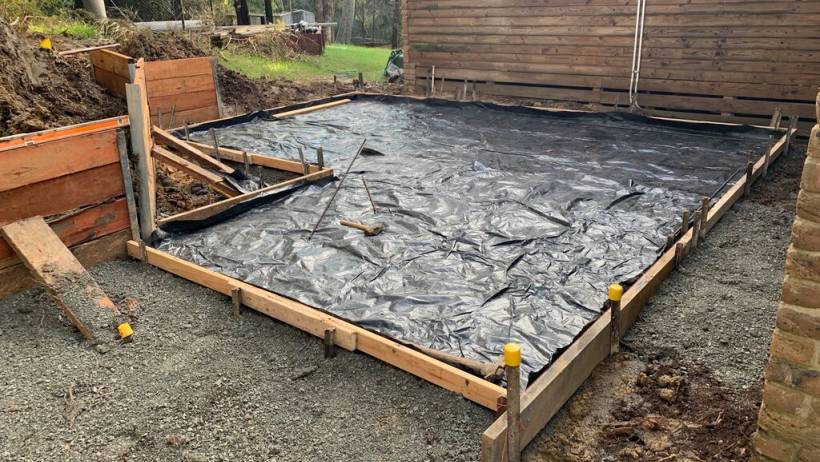
The pouring of concrete. | Source: Brian horig concreting services
Several factors affect your final concreting bill. Understanding these helps you budget and identify where you might adjust plans to manage costs.
Location and labour costs
Where you live determines concreting prices. If you’re comparing concrete price per square metre across cities, factor in delivery surcharges and availability of skilled labour. For example, Sydney concreters charge $55 to $80 per hour, while Brisbane typically rates $50 to $75 an hour.
Meanwhile, Perth’s busy construction industry drives rates higher through strong demand. In comparison, Adelaide offers better prices thanks to stable market conditions. Rural areas offer a unique set of challenges. Although labour costs are lower, challenges with material delivery and contractor availability can negate these savings.
Local council requirements also affect costs. Some areas mandate specific concrete grades or inspections that increase expenses.
Type of concrete and finish
Your finish choice drives costs more than most other factors. Below are price estimates for this add-on cost.
- Plain grey concrete: The most affordable option at $75 to $150 per square metre.
- Coloured concrete: Adds $20 to $40 per square metre using oxide additives.
- Exposed aggregate: Costs $120 to $200 per square metre due to decorative stones and special surface treatment.
- Polished concrete: Runs $100 to $270 per square metre, requiring multiple grinding and sealing steps.
- Stamped patterns: Reaches $120 to $160 per square metre for designs that mimic brick, slate, or timber
- Stencilled designs: Costs $120 to $200 per square metre.
- Spray-on resurfacing: For existing concrete, costs $50 to $80 per square metre.
Project size and complexity
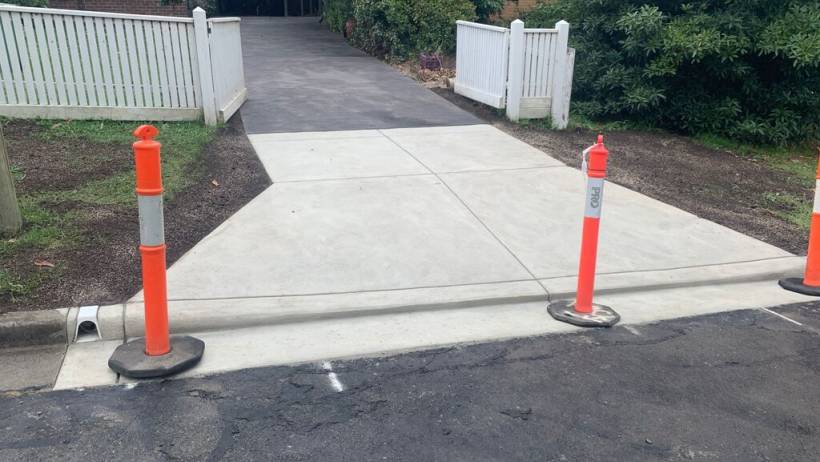
Completed concrete driveway. | Source: Brian horig concreting services
Bigger projects allow contractors to spread their fixed costs over larger areas, lowering the concreting cost per m2. In contrast, very small jobs may see a higher concrete per square metre cost because contractors apply minimum charges.
That said, complex designs still increase expenses regardless of the size of the project. Curved edges, multiple levels, or detailed patterns prolong labour times and waste materials. When estimating how much a concrete slab costs without accounting for your desired design, you’d be surprised how much it can add as much as 15% to simple rectangular slab costs.
Concrete thickness and reinforcement
The thickness of a slab directly affects how much concrete is needed, which in turn influences how much does concrete cost per cubic metre when ordering from suppliers. The table below summarises typical choices and their uses.
| Slab type / Reinforcement | Common use | Approx. thickness/volume | Estimated added cost* |
| Standard slab | Foot traffic, light vehicles | 100 mm thick (0.1 m³ per m²) | Base price |
| Heavy-duty slab | Heavy vehicles, high loads | 150–200 mm thick | 50–100% more than a standard slab |
| Steel mesh (SL72 or SL82) | General reinforcement for paths and patios | – | Adds $10–$12 per m² |
| Thicker mesh (SL92) | Driveways and high-stress areas | – | Adds $12–$15 per m² |
| Fibre reinforcement | Added crack resistance, light-duty slabs | Mixed through concrete | Adds $7–$10 per m³ |
| Edge thickening | Load-bearing edges, slab stability | Extra concrete and labour | Variable |
| Post-tensioned slab | Reactive or unstable soils | Tensioned cables in slab | Adds $25–$40 per m² |
Site preparation and accessibility
Site preparation alone consumes 10-20% of your total budget.
Soil is the biggest concern. For example, standard soil excavation costs $50 to $150 per cubic metre to remove, but rocky soil costs much more. This can indirectly affect the quote for concrete since delivery and pouring become more complex. However, levelling, compaction, and base preparation are usually included in a concreter’s site preparation quote.
Other considerations include slope and plumbing. For the former, you may need to install a retaining wall before starting to ensure a stable base, while for the latter, account for the installation of a septic tank nearby.
Accessibility is another. If a concrete truck can’t easily get to your site, you might need concrete pumping services, adding $170 to $230 per hour to your bill. If your site is tucked down a narrow side passage where wheelbarrows barely fit, expect labour costs to climb dramatically, as workers need to manually haul concrete in buckets instead of wheeling it straight from the truck.
Permit and regulations fees
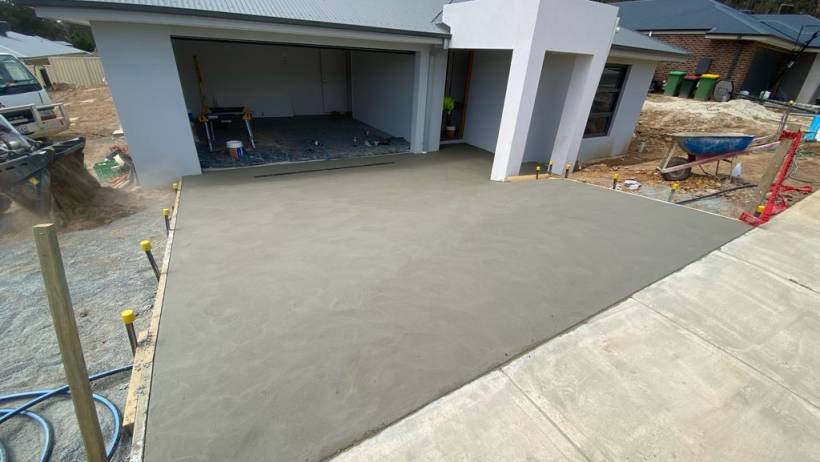
A plain grey concrete. | Source: J J Brown Constructions Pty Ltd
For larger concreting jobs, it’s important to budget for permits, engineering requirements, and compliance with Australian standards. Additionally, the final price of concreting may increase due to specific site needs and finishing touches.
Securing permits often depends on the state or territory; you can earmark $200 to $800 for a typical permit. Some territories also have special requirements. In Victoria, for example, the bigger the project value, the more expensive the permit.
In some cases, geotechnical reports are required to assess soil stability, particularly for sloping sites or areas with reactive clay. These can cost an additional $500 up to $1,500.
Other additional costs
You should also expect to pay for extra costs that are important for the whole job but that you might not normally think of when doing concrete work. Below is a table detailing these common extra works.
| Cost item | Typical price range* | Common uses |
| Soil testing and slab design | $500–$800 | Determines appropriate slab type and reinforcement |
| Independent inspections | $200–$470 each | Quality and compliance checks at various stages |
| Surveyor (boundaries) | $400–$3,000 | Confirms correct siting before work begins |
| Standards compliance | Included in professional service costs | AS 3600 (concrete structures), AS 2870 (residential slabs), and NCC termite/moisture requirements |
| Soil removal | $55–$150 per m³ | Disposal of excavated soil |
| Old concrete removal | $60–$100 per tonne | Demolition and disposal |
| Drainage (agricultural pipes) | $50–$80 per linear metre | Prevents water pooling around the slab |
| Concrete sealing | $25–$40 per m² | Protects against stains and weathering |
| Curing compounds | $8–$15 per litre | Improves strength and reduces cracking |
| Temporary safety fencing | $5–$9 per metre per week | Site security during work |
| Power floating | $8–$15 per m² | Produces a smooth, dense finish |
| Debris disposal | $150-$200 per m³ | Proper disposal of construction debris like timber formwork or packaging |
| Crack repairs | $300–$500 per crack | Post-installation remedial work if required |
*Costs vary by location, project complexity, and contractor rates.
Tips to hire the right concreting service provider
Renovation of a backyard. | Source: Ozra Construction Services Pty LtdHiring a concreter requires some research, but it pays off when the work meets Australian standards and stands the test of time.
Licencing and qualifications
Check that the concreter holds the correct licence for the job and location. In Australia, this might depend on how much the project is valued, including labour and materials, per territory or region. For example, in Queensland, a QBCC licence is needed for work valued over $3,300, while in New South Wales, the threshold is $5,000.
They should also carry appropriate insurance (e.g., workers’ compensation and/or public liability insurance) to protect everyone involved.
A competent concreter will know the relevant Australian Standards and local building codes that apply to your project. They should be able to explain how they will meet those requirements.
Experience and portfolio
Ask to see examples of work similar to what you need. If you are looking into the cost of a concrete footpath, for example, review past projects with that finish. Look at both recent and older examples. Work completed several years ago will show how well it has performed under weather, use, and ground movement.
Local experience can also be valuable. Concreters who work regularly in your area understand soil conditions, the effect of the climate on curing times, and council requirements.
References and reviews
Speaking with recent clients can provide useful insight. Ask about punctuality, communication, and how any unexpected issues were handled. A direct question about whether they would hire the same concreter again can be telling.
Don’t just look at a contractor’s concrete per square metre cost. Online reviews can also be helpful if you search for patterns rather than single comments. Note consistent concerns, as well as repeated praise for particular strengths.
Detailed quotes and contracts
A professional quotation shouldn’t just tell you how much concrete costs per square metre. It should also list the cost of materials, labour, site preparation, and finishing. It should also state the grade of concrete, reinforcement type, and slab thickness. Lack of detail can lead to misunderstandings.
Be sure to review the payment terms as well. A deposit of around 10% is common, with further payments linked to specific stages of completion. The contract should include the agreed price, payment schedule, timelines, and warranty provisions for structural defects, and a process for approving changes. A valid quote should remain open for at least 30 days to give you time to compare options.
How to save money on your next concreting project
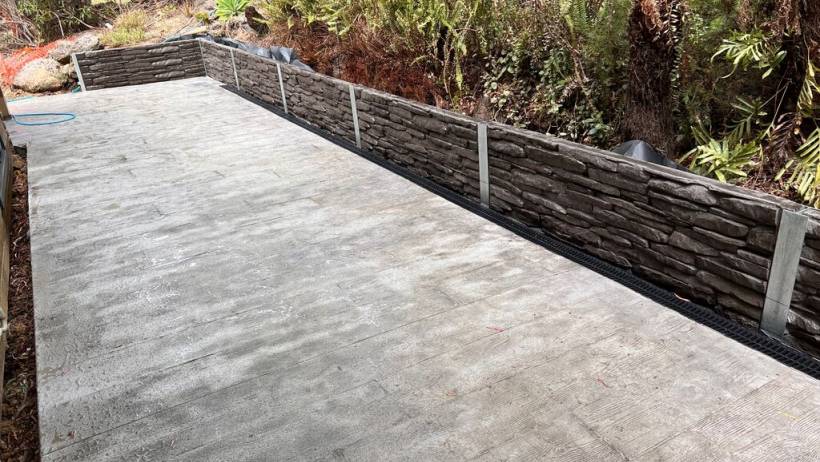
Textured concrete porch. | Source: Brian horig concreting services
Keeping costs down doesn’t have to mean cutting corners. With planning and the right approach, you can make smart choices that protect your budget and the quality of the work.
- Choose simpler designs. Plain concrete with saw cuts can look neat and modern and cost considerably less than decorative finishes. A broom finish adds slip resistance without the additional labour and materials that come with options like stamping, stencilling, or exposed aggregate.
- Buy materials in bulk. Concrete suppliers often charge less per cubic metre for full truckloads, which usually range from six to eight cubic metres. If your project doesn’t need that much, coordinate with neighbours or nearby projects to share a delivery, reducing transport expenses.
- Book during quieter periods. Contractors’ prices can be more competitive during the cooler months, particularly June to August. By contrast, the weeks leading up to Christmas are among the busiest times of year; expect higher rates or longer wait times.
- Get proper site assessments. An on-site inspection allows the contractor to measure accurately, assess access, check ground conditions, and identify any potential obstacles before quoting. This means the price you receive is more likely to reflect the final cost.
- Compare multiple quotes. Get at least three written quotes that break down the costs of materials, labour, preparation, and finishing. If there’s a large difference in pricing, ask why. A very low price could be due to a thinner slab, a lower concrete grade, or less reinforcement, which may cost you more in repairs later.
A concrete plan for your next concreting project
Quality concreting represents a major investment that delivers decades of reliable service. While premium finishes and thorough site preparation increase upfront costs, they save money through extended life and fewer repairs.
When you’re ready to start your concreting project, connect with our licensed concreters and pavers. Our verified contractors deliver quality work backed by warranties and insurance, ensuring your concrete investment stands the test of time.
FAQs on concreting
How long does it take for concrete to cure in Australia?
Is acrylic sealer good for concrete?
Is exposed aggregate concrete more expensive?
Do you need a permit for concreting in Australia?
How much does concreting cost in Melbourne?
What are the concreting prices in Brisbane?
What is the standard thickness for a residential concrete slab in Australia?
Real Oneflare customer quotes
Natalie's concreting job
Job type
Concrete slab
Location
Shed
Size
Approximately 2.3m x 2.3m
$75inc. gst
Quoted by KENJEE Improvements
Deepak's concreting job
Job type
Concreting pathway
Location
Around newly constructed home
Size
Approximately 70m²
$3900inc. gst
Quoted by Mlc Contracting
Stu's concreting job
Job type
Concrete slab
Location and size
Approximately 2m x 3m courtyard
Digging needed?
No
$1050inc. gst
Quoted by TD Concrete Constructions

